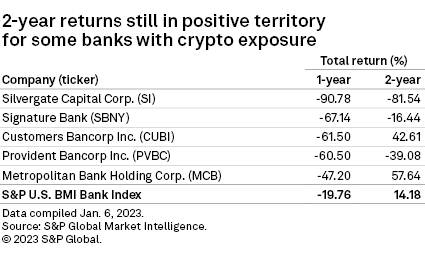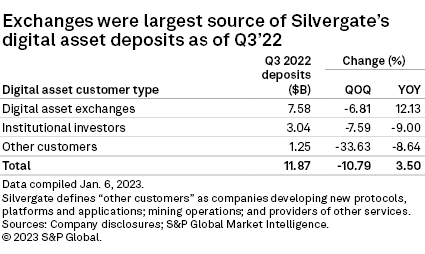Stocks of several banks with exposure to cryptocurrency assets have plummeted in the past year, but some are still up on a two-year basis thanks to how much they soared during the last crypto bull run.
In a two-year time frame, two banks with lighter exposure to crypto or more diversified business mixes — Customers Bancorp Inc. and Metropolitan Bank Holding Corp. — generated positive returns on their shares, and both outperformed the benchmark index. As of the third quarter of 2022, deposits generated from crypto customers accounted for 10.8% of total deposits for Customers Bank and 13.3% for Metropolitan Commercial Bank, according to an analysis by S&P Global Market Intelligence.
As of Jan. 6, the one-year total returns of five select bank stocks with exposure to crypto assets were all far below that of the industry benchmark index. Silvergate Capital Corp., which has the highest concentration of crypto-related deposits among the five, was hit hardest with a negative 90.8% one-year return on its shares and a negative 81.5% two-year return.

The crypto industry stumbled in late 2022 after the collapse of stablecoin pair TerraUSD and Luna in May triggered the bankruptcy of crypto lenders Voyager Digital Ltd. and Celsius Network Inc. The foundering of FTX Trading Ltd. in November pushed BlockFi Inc. to file for bankruptcy later the same month. Genesis Global Trading Inc. is the latest player reportedly evaluating options that include a potential bankruptcy filing.
Silvergate and Signature Bank both service FTX and BlockFi. Voyager has been working with Metropolitan Commercial Bank, a unit of Metropolitan Bank Holding Corp., and Genesis works with Customers Bank of Customers Bancorp, according to public disclosures. While those relationships tend to be around payments and deposits, Provident Bancorp Inc.'s banking unit BankProv also posted losses on loans made to distressed cryptocurrency miners.
Exits and uncertainties
Banks with crypto exposure are facing worsened crypto market conditions and downward trends in their stock prices. The sector's vulnerabilities have prompted regulators to warn U.S. banks against significant risks due to concentrated exposures to the crypto sector, according to a joint statement Jan. 3.
BankProv CEO Dave Mansfield stepped down in December following what Stephens analyst Matt Breese referred to as "a chaotic few months" stemming from the soured loans.
"Overall, we were not surprised by the management transition and expect more corrective actions in the months to come," Breese wrote Dec. 28. The bank did not publicly discuss its future crypto strategy in recent months, and its website still lists a section about its "crypto business."
* Download a template to compare a bank's financials to industry aggregate totals.
* Download a tear sheet to run a stress test on banks and thrifts.
* Read some of the day's top news and insights from S&P Global Market Intelligence.
On Jan. 9, Metropolitan Community Bank announced it will wind down banking relationships with the last four of its crypto customers in 2023. It has not onboarded new crypto customers since 2019 but previously wanted to keep the deposits from existing crypto clients.
J.P. Morgan Securities analysts wrote in a Jan. 9 note that they consider Metropolitan undervalued at current valuations and believe exiting the crypto-related business will lift one overhang on its shares.
Signature Bank executives said in December that the company is not exiting crypto banking but aims to reduce the deposits from crypto customers to a maximum of $10 billion, with the goal of decreasing such deposits to about 15% of total deposits over time.
Silvergate executives reiterated the bank's commitment to crypto customers in a business update Jan. 5. Although Silvergate sold assets at a discount in the fourth quarter to cover the drastic deposit outflows, its long-term earnings power is now in question due to its concentration in the crypto sector.





